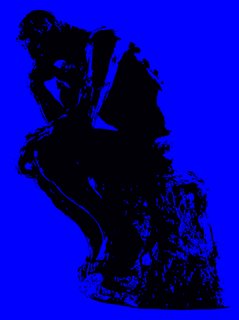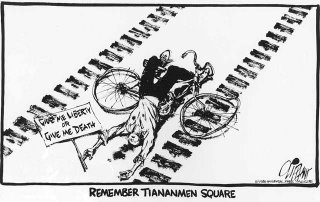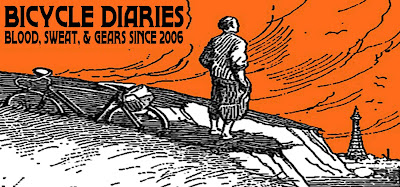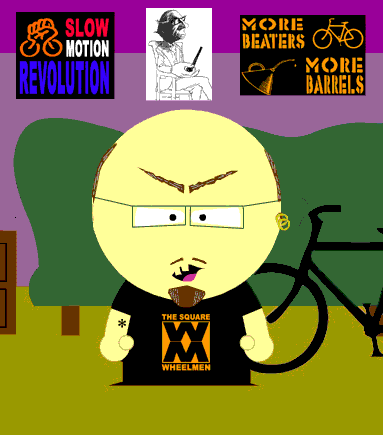Finally, you are what you think
the last of 3 essays
on books, bikes, and thinking
on books, bikes, and thinking
 Thinking is what I do for a living. In fact it's a large part of my very being. This doesn't mean that all I do is think. Rather, I try to be mindful of what I do and say particularly in terms of their impact on the world around me. This goes for writing as well as rolling.
Thinking is what I do for a living. In fact it's a large part of my very being. This doesn't mean that all I do is think. Rather, I try to be mindful of what I do and say particularly in terms of their impact on the world around me. This goes for writing as well as rolling. My mindfulness, however, isn't inspired by the wonderful example of the Buddha. It's inspired by a stoic philosopher, Marcus Aurelius (121 - 180 AD). He was the last of the Five Good Emperors who kept Rome at peace depsite internal challenges from the early Christians and external attacks by German barabarians.
My mindfulness, however, isn't inspired by the wonderful example of the Buddha. It's inspired by a stoic philosopher, Marcus Aurelius (121 - 180 AD). He was the last of the Five Good Emperors who kept Rome at peace depsite internal challenges from the early Christians and external attacks by German barabarians. For Aurelius, Stoicism is all about realizing that the only things you can control in life are what you think, what you say, and what you do. Conversely, you can never control what others think, say, or do. If you know the difference between the two your life will be a hell of a lot less frustrating. To give a clearer picture of how this applies to the life of a roller I've come up with 6 basic principles.
For Aurelius, Stoicism is all about realizing that the only things you can control in life are what you think, what you say, and what you do. Conversely, you can never control what others think, say, or do. If you know the difference between the two your life will be a hell of a lot less frustrating. To give a clearer picture of how this applies to the life of a roller I've come up with 6 basic principles.1. Control only what you can control.
2. Ignore the rest.Fed up with paying for gas, parking, and insurance? Simply stop driving. Or drive less and ride a bike. Sick of paying 60 bucks a pop each time somebody else tunes up your bike? Learn how to do it yourself.
3. Know the difference between the two.But don't try to prove something to everyone else by riding a 10 foot freakbike when you know you'll probably fall off. Why not try a fixie instead?
4. Do it everyday and with everything.Be courageous. Try new things. Build yourself a bamboo bike trailer. Try rolling in winter. But accept your limitations. If you fail, don't beat yourself up; hey, you're human! Failure is a big part of the lifelong learning experience.
5. Accept that everyone else is responsible for doing the same thing.I've been carfree since 2002. I'm definitely healthier. I'm happier too. Knowing how to fix a flat or open up a Sturmey-Archer 3speed Hub has given me the confidence to try other things like learning how to navigate html and Adobe Illustrator CS2.
6. When you wake up every morning, the fact that you're not dead ... yet.Cagers cut you off. Massholes drink and tumble in front of you during Critical Mass. You've made your choices; they've made theirs. The best you can do is try to get out of their way. Only they, not you, can change their behavior. But they might just change because of your example, not your dirty looks or trash talk.
I've been doored three times, twice by taxis. I'm sure there'll be more accidents. Cagers aren't going away anytime soon. There's nothing I can do to change that. Instead I concentrate on what I can control. I never roll so fast that I'll get seriously injured. And I always try to remember that if I were to die tomorrow I'd have no regrets whatsoever. Whether on the streets of Chicago or China or a lot of other countries, life has been good to me.
 I don't doubt that some will think all this sounds rather fatalistic. It really isn't. Life is tough; it can be nasty, brutish, and short. What each of us has, however, is the power to choose how we deal with it. That's what makes us human beings. That's what makes everyday life incredibly noble and heroic; something that Blaise Pascal pointed out many, many years ago.
I don't doubt that some will think all this sounds rather fatalistic. It really isn't. Life is tough; it can be nasty, brutish, and short. What each of us has, however, is the power to choose how we deal with it. That's what makes us human beings. That's what makes everyday life incredibly noble and heroic; something that Blaise Pascal pointed out many, many years ago.347. Man is but a reed, the most feeble thing in nature; but he is a thinking reed. The entire universe need not arm itself to crush him. A vapour, a drop of water suffices to kill him. But, if the universe were to crush him, man would still be more noble than that which killed him, because he knows that he dies and the advantage which the universe has over him; the universe knows nothing of this.
Labels: cagers, critical mass, Lincoln Square, pax, pensées, writing







0 Comments:
Post a Comment
<< Home